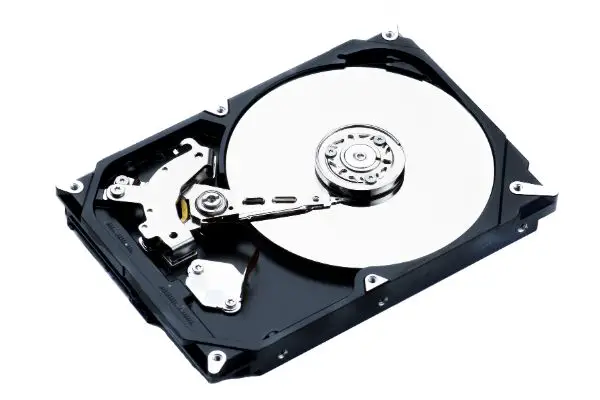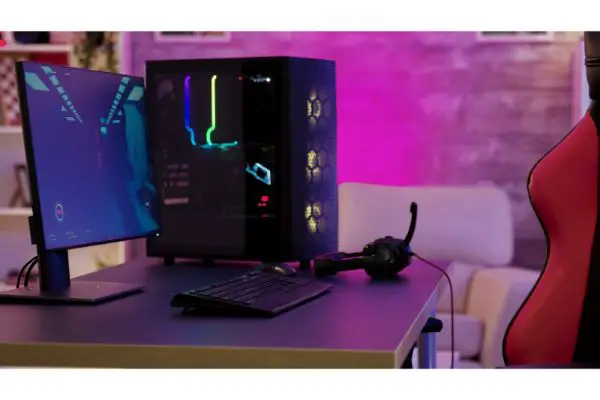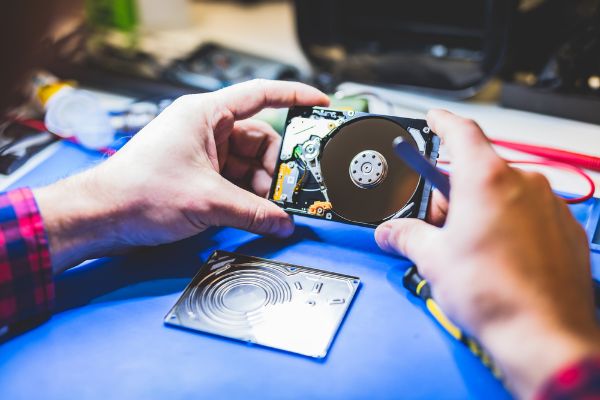Disclaimer: This post may contain affiliate links, meaning we get a small commission if you make a purchase through our links, at no cost to you. For more information, please visit our Disclaimer Page.
If you’re a gamer, you know that speed is everything. Every millisecond counts when it comes to reaction time and getting the competitive edge over your opponents.
So if your gaming experience is being ruined by performance issues, you may wonder if your hard drive is to blame.
In this article, we’ll explore the relationship between gaming and hard drives, and offer some solutions to help you get back to winning!
Table of Contents
How Does a Hard Drive Affect Gaming Performance?
There are a few ways that a hard drive can affect your gaming experience: boot time, load time, and in-game stuttering.
1. Boot-Time
The speed of your hard drive can affect how long it takes to boot up your computer and launch your game. If you’re sick of waiting around while your game loads, upgrading to a faster hard drive is a great solution.
2. Load-Time
Similarly, the speed of your hard drive will affect how long it takes to load levels or assets in your game. If you’re noticing longer than usual load times, a faster hard drive can help to alleviate that issue.
However, it’s important to note that load times are also affected by other factors like CPU and GPU speed, so be sure to troubleshoot other potential causes as well.
3. In-Game Stuttering
A hard drive can affect your gaming experience by causing in-game stuttering. This is when the game appears to freeze or skip for a few seconds at a time.
This happens when the hard drive is unable to keep up with the game’s demand for data.
4. FPS Drops
FPS stands for “frames per second.” It’s a measure of how smooth a game appears to be.
If you’re noticing FPS drops, it means that the game is lagging or stuttering. This can be caused by a variety of factors, but a slow hard drive is one possible cause.
5. Game Crashes
Finally, a hard drive can affect your gaming experience by causing game crashes. This is when the game suddenly closes or shuts down without warning.
Game crashes can be caused by corrupt files, incompatible drivers, or other issues. However, a slow hard drive can also be to blame.
However, according to a test by PCGamer, a popular gaming magazine, the difference in performance between a standard hard drive and a solid-state drive is relatively small.
So if you’re on a tight budget, it might not be worth upgrading just for the sake of gaming.
When Will a Hard Drive Affect Gaming Performance?
A hard drive will affect gaming performance when the game is demanding more data than the hard drive can handle.
This typically happens when there are a lot of files being accessed at once, such as during high-action sequences or in games that require large amounts of storage space.
Here are a few pointers on when your HDD will have an effect on gaming:
1. If you’re playing a game that’s installed on your hard drive, the speed of your hard drive will affect how long it takes to load.
2. If you’re playing a game that’s stored on a slow hard drive, you may experience FPS drops or stuttering.
3. Games with large maps or that require a lot of textures and assets will be more affected by a slow hard drive.
4. If you have added a lot of mods or DLC to your game, it may be causing the game to demand more data from your hard drive than it can handle. Most games have a limit on the number of mods that can be used at once.
5. If you’re using a PC that doesn’t have a lot of RAM, your hard drive may be used to store some of the game’s data. This can cause the game to run slowly or experience FPS drops.
Games with smaller maps, simple graphics, or that don’t require a lot of storage space will be less affected by a slow hard drive. Even action games, strategy games can safely run on an HDD.
Can a Bad HDD Cause FPS to Drop While Gaming?
There are many potential causes for FPS drops while gaming and a failing or bad HDD is one of them. If your game starts stuttering or slows down randomly, it could be an indication that your HDD is on its way out.
In order to test this theory, try running a game from your SSD if you have one.
If the issue persists, then it’s likely not caused by your HDD. However, if the game performs better from your SSD, then there’s a good chance that your HDD is to blame.
To determine whether or not your HDD needs to be replaced, try doing some benchmarking tests to see how well it’s performing. You can also run disk checking tools to check for any errors that might be causing performance issues.
If you find that your HDD is the root of your FPS issues, then it’s time for a replacement. Be sure to shop around and compare prices, because HDDs can vary quite a bit in price. And don’t forget to back up all your important files before you start the replacement process!
Can HDDs Cause Game Lag?
A game will access your HDD in order to load textures, models, and maps. If you have a slow HDD, this can cause game lag. However, a normal HDD, performing at optimal levels, will not cause any game lag. If you are experiencing game lag, it is likely not because of your HDD.
HDDs can also cause game lag if they are filled to capacity with files. If your HDD is almost full, the game may have trouble accessing necessary files and this could result in in-game lag. To avoid this, make sure to regularly clean out your HDD and delete unnecessary files.
Another thing that can cause game lag is a bad graphics card or CPU. If your computer isn’t powerful enough to run the game smoothly, you will experience game lag. In order to fix this, you may need to upgrade your hardware components.
Sometimes, it is possible to improve game performance by upgrading your HDD to an SSD. This will allow the game to access data faster, which can reduce or eliminate lag.
However, if your computer cannot handle the extra workload that an SSD would provide, then upgrading to one may not help at all. In this case, you would be better off sticking with your current HDD.
It is also important to keep in mind that not all games are created equal when it comes to performance.
Some games may benefit more from an upgrade than others. So before making any decisions, do some research on what games are the most demanding and see how they perform on your system.
How to Improve Gaming Performance with a Hard Drive
If you’re looking to improve your gaming performance, there are a few things you can do:
First, make sure that your hard drive is properly configured. This means making sure that it’s set to AHCI mode in the BIOS and that it has a healthy amount of space available.
Second, upgrade your hard drive to a faster model. If you’re using an HDD, consider upgrading to a solid-state drive. This will give you the biggest performance boost.
Third, make sure that your PC meets the minimum system requirements for the game. If your PC is too slow, no hard drive will be able to help you.
Fourth, consider adding more RAM to your PC. This will help to improve overall performance, including gaming performance.
Finally, make sure that you have the latest drivers and updates installed. This includes updates for your operating system, BIOS, and hardware components like your graphics card and sound card.
Updating your drivers can be a pain, but it’s important to do if you want to ensure optimal performance. You can usually find the latest drivers on the manufacturer’s website or through Windows Update.
If you follow these tips, you should see a noticeable improvement in your gaming performance. Hard drives are just one part of the equation, but they can have a big impact on gaming. So make sure that yours is up to the task.
The Bottom Line
A hard drive can affect your gaming experience in a few different ways. If you’re noticing long load times, stuttering, or FPS drops, a faster hard drive may help to improve your gaming experience.
However, it’s important to keep in mind that your hard drive is just one factor to consider. There are many other things that can affect gaming performance, such as your graphics card, CPU, and amount of RAM.
If you’re looking for the biggest performance boost, upgrading to an SSD is the best way to go.
However, not all games will benefit from this upgrade. So do some research before making a decision.
In addition, keep your drivers and software up-to-date. This can help to improve overall performance, including gaming performance.
If you follow these tips, you should see a noticeable improvement in your gaming experience no matter what type of hard drive you have installed.



